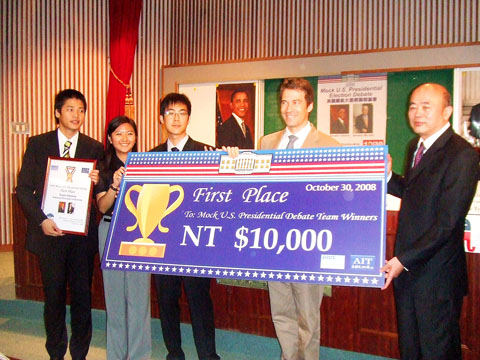With less than a week to go before the US presidential election, university students in Taiwan yesterday argued for their preferred candidate as the catalyst to revitalize US competitiveness in a mock debate held at National Chengchi University (NCCU).
Six non-native English-speaking students debating in fluent English provided facts to buttress their arguments.
Representing Democratic candidate Senator Barack Obama, three NCCU students from the School of Diplomacy argued that the freshman senator from Illinois possessed the skill and the backing of experienced advisers, which would help him steer the US through the current financial storm by reducing healthcare costs, strengthening the labor market and setting a timetable to withdraw US troops from Iraq.

PHOTO: JENNY W. HSU, TAIPEI TIMES
Arguing US Senator John McCain under the banner of “yes we can, but with McCain,” three National Tsing Hua University (NTHU) students played the patriotism card by underlining the war veteran's decades of government service and his promise to slash capital gains taxes in order to spur investments and create new jobs.
The debate, sponsored by the American Cultural Center (ACC) of the American Institute in Taiwan (AIT), is part of a series of events highlighting the US presidential race and the US electoral system.
AIT officers and political science professors peppered the student debaters with questions from the war on terrorism, the prudence of the US$700 billion bailout plan, selection of future supreme justices and implementation of an effective healthcare system.
The students also sparred with one another by grilling their opponents on alternative energy, Iran and Washington's relations with corporations.
“I think it was an incredible performance by the students. Considering none of them were native-English speakers, it was pretty amazing to see them speak on tough policies,” ACC director Scott Robinson said.
The audience participated by voting for their favorite team. In a close race, NCCU was announced the winner and awarded a NT$10,000 check from AIT. All six students will meet AIT Director Stephen Young next Wednesday.
Yvonne Tyan (田依凡), a Chinese literature major from NTHU, said she had a week to prepare for the debate.
“The hardest thing [about the debate] was trying not to be nervous and overcome the stage fright,” she said.
Tyan said although she sat on the McCain team, she was an Obama fan, but believed a McCain White House could be more sympathetic toward Taiwan.
Lin Wei-sheng (林偉勝), from the winning team, called himself a fence sitter because he could see problems in both candidates' platforms and said no matter who took the Oval Office next year, Taiwan-US relations would stay relatively unchanged because the Taiwan issue was not an urgent matter for either camp.
Stanley Ho (何啟汯), a computer science major from NTHU shared Lin's view, saying the Taiwan Strait, though a major flash point, was not a big issue for the world.
“What I learned from the debate is that it takes a lot of effort and confidence to speak in public about your ideas,” said Chang Shu-hau (張書豪), an aspiring diplomat from NCCU.

An essay competition jointly organized by a local writing society and a publisher affiliated with the Chinese Communist Party (CCP) might have contravened the Act Governing Relations Between the People of the Taiwan Area and the Mainland Area (臺灣地區與大陸地區人民關係條例), the Mainland Affairs Council (MAC) said on Thursday. “In this case, the partner organization is clearly an agency under the CCP’s Fujian Provincial Committee,” MAC Deputy Minister and spokesperson Liang Wen-chieh (梁文傑) said at a news briefing in Taipei. “It also involves bringing Taiwanese students to China with all-expenses-paid arrangements to attend award ceremonies and camps,” Liang said. Those two “characteristics” are typically sufficient

A magnitude 5.9 earthquake that struck about 33km off the coast of Hualien City was the "main shock" in a series of quakes in the area, with aftershocks expected over the next three days, the Central Weather Administration (CWA) said yesterday. Prior to the magnitude 5.9 quake shaking most of Taiwan at 6:53pm yesterday, six other earthquakes stronger than a magnitude of 4, starting with a magnitude 5.5 quake at 6:09pm, occurred in the area. CWA Seismological Center Director Wu Chien-fu (吳健富) confirmed that the quakes were all part of the same series and that the magnitude 5.5 temblor was

The brilliant blue waters, thick foliage and bucolic atmosphere on this seemingly idyllic archipelago deep in the Pacific Ocean belie the key role it now plays in a titanic geopolitical struggle. Palau is again on the front line as China, and the US and its allies prepare their forces in an intensifying contest for control over the Asia-Pacific region. The democratic nation of just 17,000 people hosts US-controlled airstrips and soon-to-be-completed radar installations that the US military describes as “critical” to monitoring vast swathes of water and airspace. It is also a key piece of the second island chain, a string of

The Central Weather Administration has issued a heat alert for southeastern Taiwan, warning of temperatures as high as 36°C today, while alerting some coastal areas of strong winds later in the day. Kaohsiung’s Neimen District (內門) and Pingtung County’s Neipu Township (內埔) are under an orange heat alert, which warns of temperatures as high as 36°C for three consecutive days, the CWA said, citing southwest winds. The heat would also extend to Tainan’s Nansi (楠西) and Yujing (玉井) districts, as well as Pingtung’s Gaoshu (高樹), Yanpu (鹽埔) and Majia (瑪家) townships, it said, forecasting highs of up to 36°C in those areas